By Anoushka Joshi
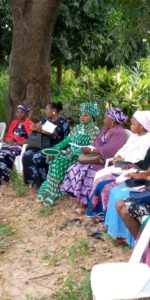
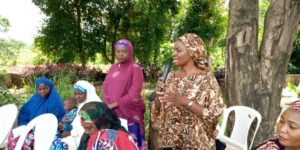 At the crossroads of ecology, economy, and interfaith dialogue, Tanenbaum Peacemaker Pastor James’ Peace Trees initiative offers a productive and inspiring solution to the rampant conflict between farmers and herders in Nigeria.
At the crossroads of ecology, economy, and interfaith dialogue, Tanenbaum Peacemaker Pastor James’ Peace Trees initiative offers a productive and inspiring solution to the rampant conflict between farmers and herders in Nigeria.
“The background for why [up until] this conflict people have coexisted together is because of the ecological challenges coming from [a] lack of replanting trees,” explained Pastor James. The cattle entering farmers’ lands to graze increases during the rainy summer season in Nigeria, when crops like corn, maize, and sorghum are grown. The destruction by the grazing cattle angers farmers who spend the majority of the year cultivating these crops in order to support themselves and their families through the dry season. Since it is the herder’s responsibility to control their cattle, the farmers blame them for their losses, which has caused escalating tension and widespread violence between the two groups. This has led to a steady increase in the death of farmers at the hands of herders in the recent past.
Pastor James’ Peace Trees aim to alleviate this situation, as they serve both the farmer and the herder. Ecologists collaborating with Pastor James are identifying indigenous trees that provide increased fodder, which the cattle can graze on instead of the farmers’ crops. These trees also have the capacity to produce more compost and oxygen through the leaves they shed, in turn, “re-energizing and re-vitalizing” the soil, Pastor James explains. His hope is that these trees will bring the farmers and the herders together on the basis of their common interests to preserve the land.
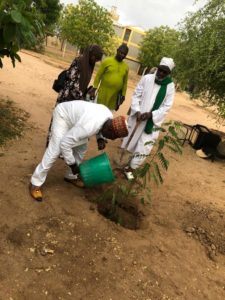 Pastor James, in collaboration with Peacemaker Imam Ashafa, has already made great progress for the Peace Trees initiative. Most recently, they are working with the Ministry of Forestry in the Kaduna state of Nigeria to execute the planting of specific trees. With a grant from the Bosch Foundation, they were able to host training sessions for women “on how to plant trees…that make for peaceful coexistence between warring communities.” They also met with financial institutions, encouraging them to plant trees around the vicinity and entrances of their banks, as part of what Pastor James deems their corporate social responsibility.
Pastor James, in collaboration with Peacemaker Imam Ashafa, has already made great progress for the Peace Trees initiative. Most recently, they are working with the Ministry of Forestry in the Kaduna state of Nigeria to execute the planting of specific trees. With a grant from the Bosch Foundation, they were able to host training sessions for women “on how to plant trees…that make for peaceful coexistence between warring communities.” They also met with financial institutions, encouraging them to plant trees around the vicinity and entrances of their banks, as part of what Pastor James deems their corporate social responsibility.
Pastor James and Imam Ashafa also use the Peace Trees initiative as a means to continue promoting interfaith collaboration in Nigeria. They have called upon religious leaders and followers throughout the nation to plant their own Peace Trees. As Pastor James says, “We want to involve religious leaders because we have the largest followership in Nigeria…When we send messages through the networks of the churches and mosques to create awareness, the impact will be faster, the action will be better, and the land will be saved.”
They have begun conducting workshops to train Christians and Muslims alike on the initiative. Following an overview of the ecology behind the trees and an analysis of Bible and Quran passages on the concept of “planting,” Pastor James and Imam Ashafa open up a discussion with workshop attendees on the cost of deforestation. Since many of the individuals attending these workshops face erosion and flooding in their communities, Pastor James believes that “this reawakens people to their responsibility.” The workshops end with their participants making commitments to God to protect their land, by way of planting the Peace Trees. “Healing the land, in this case, is planting the trees,” affirms Pastor James.
The Peace Trees will also have economic benefits. A few years ago, Pastor James held a revival service where the attendees made a covenant with their land, promising to preserve it. As part of this covenant, he encouraged his followers to plant more trees: “I remember I told all the women to plant…an orange tree for every female and female child. For a boy, plant a mango tree. All the male folks are meant to plant mango trees.” In the following three years, the members of that community had abundances of oranges and mangoes that they were then able to sell at the market. “In that regard, you did not just empower them to plant trees to save the land, but you also gave them the economic benefits of planting those trees,” says Pastor James, with the vision that the Peace Trees will serve the same purpose.
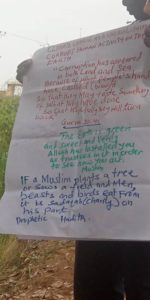 A
A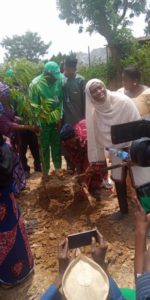 foreseeable challenge is planting the Peace Trees during the dry season. However, Pastor James has certain solutions he plans to implement, such as an increase in manual watering as well as the “Divine Intimidation Strategy.” For Pastor James and other religious leaders, the act of tree planting is equated to “an act of worship to the great divine.” Viewing tree planting as a sacred ritual will in turn increase the participation of religious followers in the initiative.
foreseeable challenge is planting the Peace Trees during the dry season. However, Pastor James has certain solutions he plans to implement, such as an increase in manual watering as well as the “Divine Intimidation Strategy.” For Pastor James and other religious leaders, the act of tree planting is equated to “an act of worship to the great divine.” Viewing tree planting as a sacred ritual will in turn increase the participation of religious followers in the initiative.
Though they launched the Peace Trees initiative in Kaduna state, Pastor James and Imam Ashafa plan to expand their work: “We hope to do it in other violent communities like Plateau state, Zamfara state, Katsina state, where these herders and farmers and bandits are rampant.” The trees will be used as a means to alleviate gang violence both in Kaduna state and beyond. By providing incentives to gangs on the basis of which community plants the most trees, the initiative will be able to foster healthy competition — instead of aggressive rivalry — between them. “It is part of dealing with issues of psycho-social trauma, where trees can also be a way to reduce the stress and tension that comes with kidnapping, killing, and [the] terrorism that has taken over our country.”
At the end of the interview, Pastor James shared an inspiring proverb: “a stitch in time saves a million.” In other words, acting to resolve a conflict from an early stage is much better than facing its escalation in the long term. Encouraging collaboration between the herders and farmers through the act of tree planting will not only help alleviate their tensions before they escalate, but also play a crucial role in healing the land they depend and live on. “We re-inject life into the land and how do spiritual people, how do religious leaders do that? [By] having peaceful coexistence in their minds. That is the Peace Trees project.”